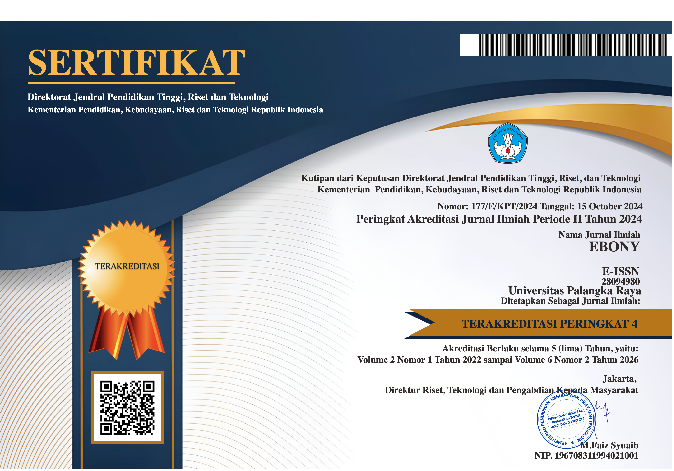A Narrative Inquiry of an English as a Foreign Language (EFL) Teacher’s Experiences in Working with Special Needs Students
DOI:
https://doi.org/10.37304/ebony.v3i1.7954Keywords:
special needs students, English teaching, narrative inquiryAbstract
This study is intended to unravel how an EFL teacher working in a special needs school teaches her students. The central issues of this study are challenges and strategies employed by the teacher, government concern, readiness, and future expectations of the teacher. Narrative inquiry is carried out as the method of the study. This study involves a participant who has been teaching as an EFL teacher for special needs students for more than seven years. The in-depth narrative interview is conducted to collect the data. To ensure the trustworthiness of the results, the researcher confirms the interpretation of the data with the participant. From the story told by the participant, it is concluded that the biggest challenge faced by the teacher in teaching special needs students is growing their motivation. Thus, the teacher shall be wise in planning the lessons based on each students’ characteristics to enhance their learning motivation. Furthermore, in relation to the government, supports in forms of training and material availability have been given by the Indonesian government. In terms of readiness, most of the English teachers working with special needs students have limited knowledge and experiences at the initial stage of their careers. However, the teachers learn along the way through trials and errors and from a series of training provided to develop their professional skills. In the future, it is expected that the English pre-service teachers can be prepared to teach special needs students as a part of their training and education. Furthermore, the existing teachers are expected to continue learning from different media so that they can keep improving the quality of their teaching.
Downloads
References
Barkhuizen, G., Benson, P., & Chik, A., (2014). Narrative inquiry in language teaching and learning Research. New York, NY: Routledge.
Chrysostomou, M & Symeonidou, S. (2017). Education for Disability Equality through Disabled People's Life Stories and Narratives: Working and Learning Together in a School-Based Professional Development Programme for Inclusion. European Journal of Special Needs Education, 32(4), 572-585.
Connelly, F.M., & Clandinin, D.J. (1990). Stories of experience and narrative inquiry. Educational Researcher, 19(5), 2-14. doi:10.3102/0013189X019005002.
Desiningrum, Dinie Ratri. (2016). Psikologi Anak Berkebutuhan Khusus. Yogyakarta: Psikosain.
Dewi, K.Y.F. (2019). Pengajaran Bahasa Inggris untuk Anak Luar Biasa (ALB). Daiwi Widya Jurnal Pendidikan, 6 (1), 40-48.
Farrel, M. (2003). Understanding special education needs, a guide for student teachers. London: Routledge Falmer.
Hadi, FN., Wahyuni, D.S.,& Sulistyawati, H. (2019). Teacher’s strategies in teaching English for the hearing-impaired students. English Education Journal, 7(2), 264-271.
Hallahan, D. & Kauffman, J. (2003). Exceptional learners (9th ed.). Needham Heights: Allyn and Bacon.
Miller, M., & Stoeckel, P.R. (2011). Client education: theory and practice. New York: Jones and Bartlett Publishers.
Polkinghorne, D.E. (2005). Language and meaning: Data collection in qualitative research. Journal of Counselling Psychology, 52(2), 137-145. doi:10.1037/0022-0167.52.2.137.
Salifu, I., &Agbenyega, J. S. (2016). Teacher motivation and identity formation: Issues affecting professional practice. MIER Journal of Educational Studies, Trends and Practices, 3(1).
Setiadi, I.B. (2017). Teacher talk in teaching English for Students with Autism Spectrum Disorder (ASD). Jurnal Penelitian Pendidikan. 34 (1), 15-24.
Sonday, A., Ramugondo, E., & Kathard, H. (2020). Case study and narrative inquiry as merged methodologies: A critical narrative perspective. International Journal of Qualitative Methods, 19, 1609406920937880.
Westwood, P. (2007). Commonsense Methods for Children with Special Needs: Strategies for the Regular Classroom. London: RoutledgeFalmer.
Downloads
Published
How to Cite
Issue
Section
License
Copyright (c) 2023 Jumainah Jumainah

This work is licensed under a Creative Commons Attribution 4.0 International License.











